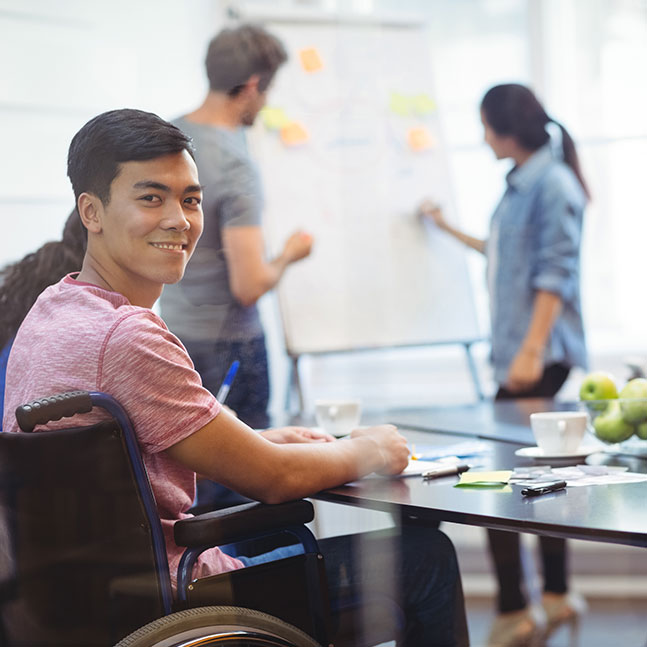News
International Day Of Persons With Disabilities: “Talent Is The Ultimate Equaliser”
Urvi Aradhya, CHRO at Mindspace Business Parks believes that when talent is the compass and the centre, discrimination becomes obsolete and that leaders must work towards making equity their greatest strength, so they can find the abilities in the disability
As we commemorate the International Day of Persons with Disabilities today, it is imperative to reflect on the strides Indian organisations have made and the path that lies ahead in fostering a workplace that champions equity and inclusivity. In the corporate realm, creating an environment that is not only physically accessible but also mentally supportive is an ongoing commitment. Urvi Aradhya, Chief Human Resources Officer (CHRO) of Mindspace Business Parks, sheds light on crucial measures for a physically inclusive workspace, addresses mental health inclusivity and emphasises the importance of equitable career progression and inclusive hiring practices.
What measures can be implemented to create a physically accessible and inclusive workplace for employees with disabilities?
It is essential to ensure that the physical facilities and office premises are designed with accessibility in mind. This includes providing ramps, elevators and accessible restrooms, and carefully planning the layout of the workspace to facilitate easy navigation. Incorporating adaptive technology is another crucial measure. This involves providing tools like screen readers, voice recognition software, and ergonomic equipment that can accommodate a range of needs. To ensure a truly inclusive environment, at Mindspace Business Parks, we have invested in state-of-the-art facilities, such as braille-equipped and voice-enabled lifts, facial recognition systems, ramps, and specially designed washrooms. Moreover, we also provide accessible parking spaces close to entrances and offer inclusive transportation options, such as accessible shuttle services, ensures that employees with disabilities can easily commute to and navigate within the workplace. These facilities ensure that our premises are not only accessible but also welcoming to all differently abled employees and visitors.
In addition to physical disabilities, how can organisations address mental health inclusivity and support employees facing mental health challenges?
Addressing mental health inclusivity is a necessary element in establishing a supportive workplace. Conducting awareness campaigns plays a vital role in educating employees about common mental health challenges and underlining the positive nature of seeking help. Fostering an open dialogue within organisations creates an environment where employees feel comfortable discussing their mental health concerns.
Ensuring easy access to mental health resources is also important. Organisations should provide information about available Employee Assistance Programs (EAPs), counselling services, mental health hotlines, and maintain complete confidentiality. This accessibility encourages employees to seek help when needed, reinforcing the organisation's commitment to supporting mental well-being.
How can leaders ensure that career progression paths are equally accessible to all employees, including those with disabilities?
When talent is the compass and the centre, discrimination becomes obsolete. Once leaders focus on abilities, they will have a diverse range of talents coming to the fore. Leaders should establish inclusive and fair policies, implement mentorship programmes to provide guidance, and prioritise training for seniors to foster awareness and an inclusive mindset. Ensure digital tools are accessible, providing assistive technologies as needed.
Talent is the ultimate equaliser which does not discriminate based on background, or (dis)abilities. Leaders must work towards making equity their greatest strength and learn to sieve well, so they can find the abilities in the disability.
How can organisations promote inclusivity in the hiring process to ensure equal opportunities for persons with disabilities?
Promoting inclusivity in the hiring process is pivotal for a diverse and equitable workplace. Some practices that organisations can adopt:
- Diverse Hiring Practices: Actively recognise and embrace a wide range of qualities and perspectives that candidates bring to the organization, ensuring a fair and inclusive evaluation process.
- Inclusive Job Postings: Clearly stating a commitment to hiring individuals with disabilities in job postings, fostering a welcoming atmosphere.
- Creating awareness: Implement disability awareness initiatives to educate staff and create a culture of support for employees with disabilities.
- Equal Opportunity Policies: Develop and enforce equal opportunity policies in accordance with relevant laws, such as the Rights of Persons with Disability Act, 2016, to ensure a discrimination-free workplace.
- Training Programmes: Conduct training programs on anti-discrimination and disability inclusion to promote understanding and sensitivity among staff.
By incorporating these practices, organisations can create an inclusive environment that goes beyond tokenism, promoting engagement, creativity, and equal opportunities for persons with disabilities.
How can ERGs and similar initiatives be leveraged to provide a platform for employees with disabilities to share their experiences and contribute to shaping company policies?
Employee Resource Groups, offer a crucial space for employees with disabilities to share their experiences and play a key role in shaping company policies. This ERG serves as a valuable reservoir of firsthand insights, enabling informed development of targeted inclusion initiatives through open discussions on challenges, successes, and opportunities for improvement. Facilitating a regular exchange of ideas and concerns ensures that the leadership is informed about the specific needs and aspirations of this employee group. This engagement helps in crafting policies and practices that are not only inclusive but also resonate with the diverse perspectives within the organisation. These initiatives contribute to creating a more empathetic and inclusive organisational culture, ensuring that employees at all levels are equipped with the knowledge and skills to support their colleagues with disabilities.
Source: BWPeople



